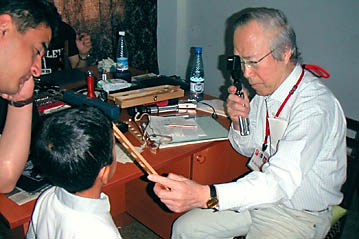Japanese scientists carry out humanitarian project for IDPs in Azerbaijan

By Sara Rajabova
The renowned Japanese scientist, Dr. Akio Kanai has started his next humanitarian mission to Azerbaijan.
Winner of the 2006 Nansen Refugee award Kanai is head of the Japanese private company, Fuji Optical and has been a generous private donor of the United Nations High Commissioner for Refugees for more than 30 years, AzerTag state news agency reported.
This will be the 10th such humanitarian mission of Fuji Optical to Azerbaijan. The mission provides free of charge eye screening and conduct eye glasses distribution to persons of concern to UNHCR, e.g. refugees, internally displaced persons and other vulnerable people.
The company started its humanitarian activity among Indo-Chinese refugees in Thailand in 1983. Since then, Fuji Optical has donated more than 141,000 pairs of eyeglasses to refugees, IDPs and other vulnerable people in six countries of Asia, Europe and Africa, conducted vision aid missions to four out of those countries.
Kanai and his team of 6 optometrists departed on April 21 for South-Western regions of Azerbaijan in order to conduct eye-screening for internally displaced persons in Imishli, Beylagan, Khojavend and Fuzuli regions.
On April 28, the services will be organized in Baku for refugees, and others of concern to UNHCR. The assistance program is carried out in close cooperation with the UNHCR Representation in Azerbaijan and local authorities.
UNHCR is a specialized UN agency which is mandated to lead and co-ordinate international interventions to protect refugees and find durable solutions for their problems worldwide.
About $1.8 million has been spent by Fuji Optical to accomplish its humanitarian activity in Azerbaijan during the last ten years.
Around 39,000 pairs of high quality optic eyeglasses and other items have been brought to the country as in-kind donation to the UNHCR operations in Azerbaijan. In total, more than 17 thousand refugees, IDPs and other vulnerable people have benefited from the free of charge vision screening services.
This year, Fuji Optical has brought 4,000 pairs of eye-glasses and other vision and hearing aid items and targets to screen about 2,000 IDPs, refugees and other vulnerable people.
The bloody war, which flared up in the late 1980s due to Armenia's territorial claims against its South Caucasus neighbor, left 700,000 civilians of Nagorno-Karabakh and the regions adjoining it, as well as the regions bordering with Armenia and Nagorno-Karabakh without homes.
They are temporarily settled in more than 1,600 settlements across 62 cities and regions of Azerbaijan.
Moreover, 250,000 Azerbaijanis were expelled from Armenia and became refugees due to Armenia's ethnic cleansing policy after the emergence of the Nagorno-Karabakh conflict with Azerbaijan.
The Azerbaijanis who had displaced from their homes as result of the brutal war were forced to live in refugee camps, tents and wagons in very difficult conditions.
As a result of the military aggression of Armenia, over 20,000 Azerbaijanis were killed, 4,866 are reported missing and almost 100,000 were injured, and 50,000 were disabled.
The UN Security Council has passed four resolutions on Armenian withdrawal from the Azerbaijani territory, but they have not been enforced to this day.
